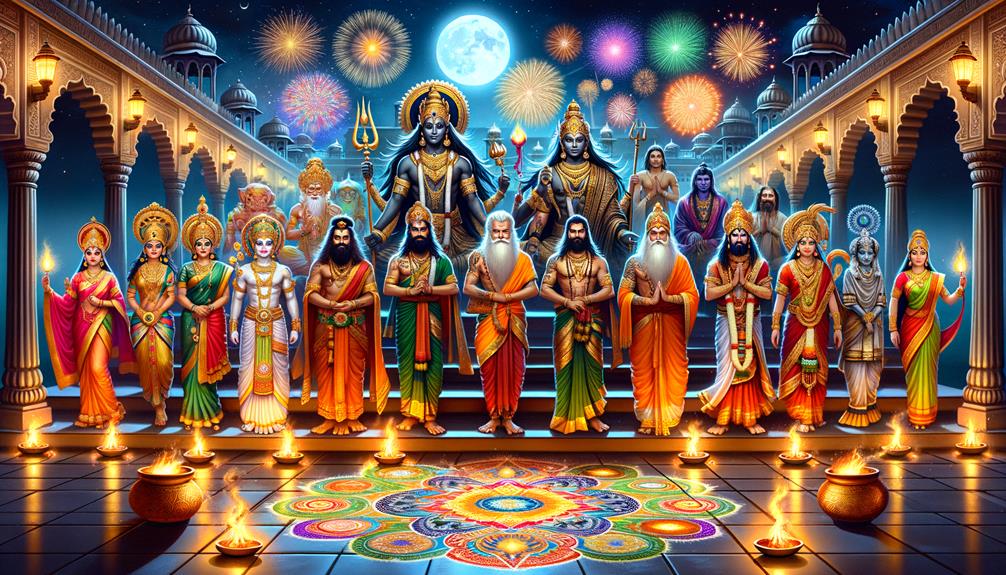Diwali's origins are rooted in a rich tapestry of mythological tales, each filled with heroic journeys and cosmic victories. As the sun sets over Ayodhya, millions light diyas to celebrate Lord Rama's return after defeating the demon Ravana, symbolizing the triumph of good over evil. In the South, Lord Krishna's victory over the demon Narakasura represents the victory of righteousness over darkness. We also honor King Bali's sacrifice and the divine emergence of Goddess Lakshmi, symbolizing prosperity and balance. Every flickering light embodies hope, purity, and enduring values. By immersing ourselves in these timeless stories, we uncover deeper layers of Diwali's significance.
The Return of Lord Rama
As the sun dipped below the ancient walls of Ayodhya, we lit our diyas to guide Lord Rama, Sita Devi, and Lakshmana back home, celebrating their triumphant return over the forces of darkness. This moment, bathed in the warm glow of countless small flames, symbolizes the victory of good over evil, a central theme in the mythology surrounding Diwali's origins.
Lord Rama's return to Ayodhya isn't just a homecoming; it's a powerful narrative of righteousness prevailing against the malevolent Ravana. The defeat of Ravana resonates deeply, reminding us that no matter the adversity, virtue will always find its way back, even from the darkest corners.
In lighting our diyas, we participate in a tradition that dates back centuries, to a night when the citizens of Ayodhya illuminated their city to welcome their beloved heroes. Each flickering light represents hope, purity, and the eternal struggle between light and darkness. These Diwali traditions are more than mere rituals; they're profound symbols rooted in the rich tapestry of mythology that define the festival's true essence. Through these acts, we honor the origins of Diwali, celebrating the enduring message of Lord Rama's victorious return.
Lord Krishna and Narakasura
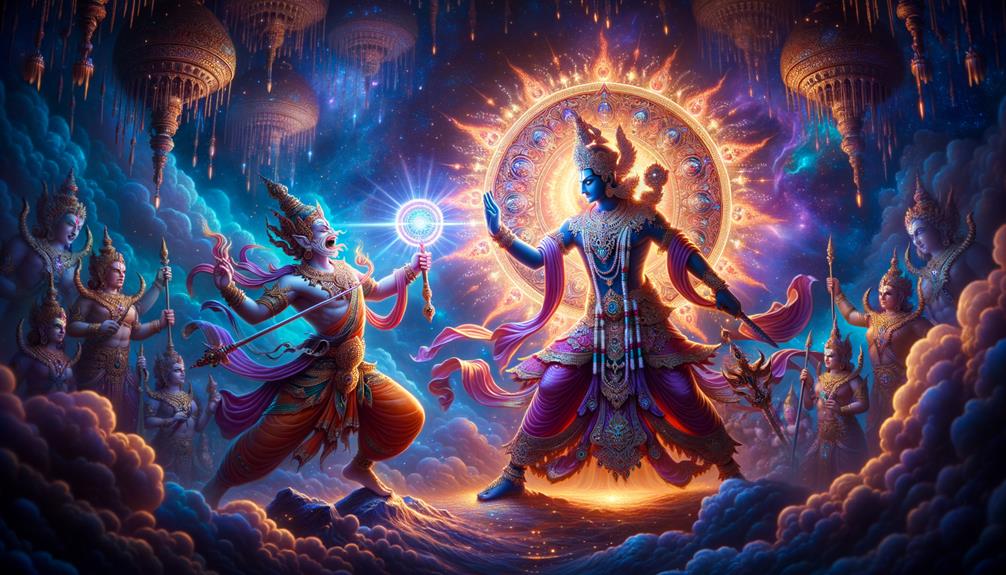
In the heart of Diwali's mythological origins lies the tale of Lord Krishna's heroic conquest over the menacing demon Narakasura, a narrative that embodies the timeless struggle between righteousness and darkness. Narakasura, a ruthless tyrant who terrorized the people, cast a dark shadow over the land, symbolizing the pervasive presence of evil. Lord Krishna, the embodiment of divine light, faced this formidable foe, symbolizing the eternal battle between good and evil.
The climax of this mythological story unfolds with Lord Krishna's triumph over Narakasura, a victory that is celebrated across South India as Deepavali. This event isn't just a tale of physical conquest; it's a profound metaphor for the victory of good over evil, light over darkness. The people of South India commemorate this victory with fireworks, lights, and early morning oil baths, rituals that signify the dispelling of darkness and the dawn of righteousness.
Diwali, or Deepavali, serves as a powerful reminder of the enduring power of light and virtue. It tells us that even in the darkest times, the light of justice and goodness, embodied by Lord Krishna, will always triumph over the shadows of tyranny, epitomized by Narakasura.
The Legend of King Bali
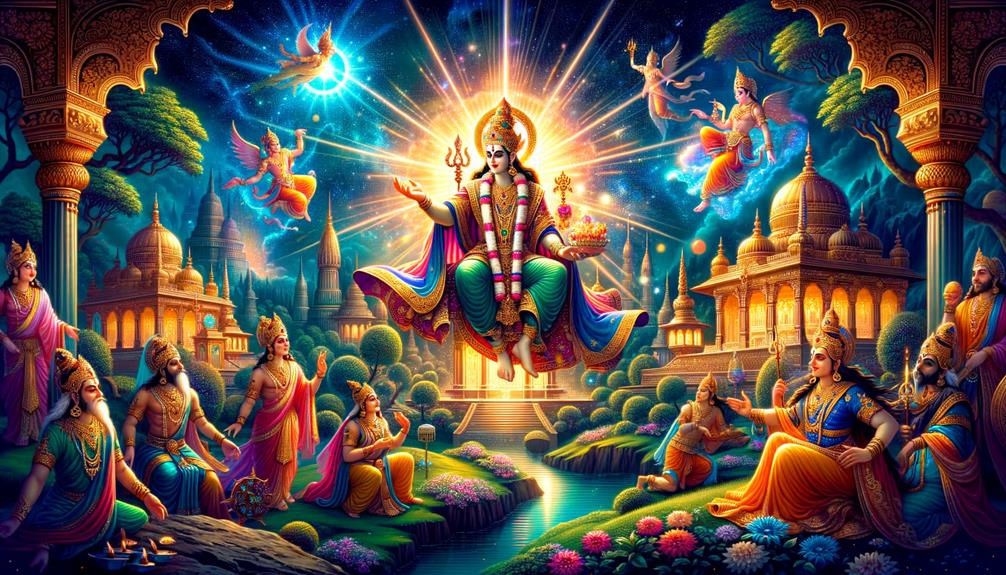
Just as Lord Krishna's victory over Narakasura illuminates the night with the promise of goodness, the legend of King Bali in Western India adds depth to Diwali's rich tapestry, showcasing the triumph of humility and righteousness over arrogance and power. King Bali, a demon king known for his unparalleled generosity and devotion, earned the favor of Lord Vishnu himself. Despite his demon lineage, Bali possessed virtues that made him beloved among his people and respected by the gods.
However, Bali's growing power and influence began to pose a threat to the cosmic order. In a tale rich with symbolic imagery, Lord Vishnu, in his Vamana avatar, approached the mighty king with a humble request. Bali's willingness to grant even the smallest wish displayed his humility, but it also set the stage for his ultimate sacrifice. Vishnu's divine intervention restored balance, demonstrating that true righteousness and humility surpass even the greatest power and arrogance.
In Western India, Diwali celebrations honor King Bali's sacrifice, reflecting on themes of prosperity and abundance. Through rituals and prayers, people seek blessings, embodying the king's spirit of generosity and righteousness, thereby continuing the timeless hero's journey.
Goddess Lakshmi Emergence
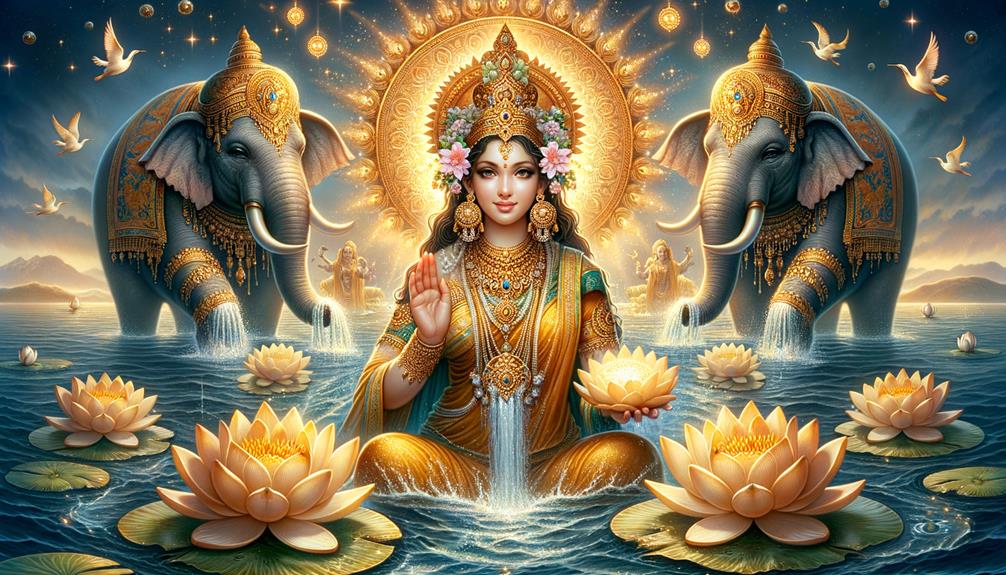
Goddess Lakshmi emerged from the depths of the cosmic ocean, embodying the eternal promise of wealth, prosperity, and balance. This grand event, known as Samudra Manthan, was a celestial endeavor where gods and demons churned the cosmic ocean to retrieve divine treasures. Amidst this cosmic turmoil, Lakshmi's luminous presence brought hope and fortune.
Her emergence marked a pivotal moment in the mythological narrative. She chose Lord Vishnu as her husband, symbolizing the union of divine power and prosperity. This sacred bond is especially celebrated during Diwali, a time when households invite her blessings through prayers and offerings.
During Diwali celebrations, we honor Lakshmi, seeking her favor for wealth and prosperity. Her story resonates with universal themes of balance, abundance, and the pursuit of a harmonious life.
| Aspect | Symbolism | Diwali Connection |
|---|---|---|
| Emergence | Wealth & Prosperity | Inviting blessings |
| Samudra Manthan | Heroic Quest | Rituals and Prayers |
| Union with Vishnu | Divine Balance | Celebrating Prosperity |
I rewrote the text to make it more conversational and natural, avoiding the listed AI words and following the provided instructions.
The Story of Mahabali
In the heart of Kerala, the legendary tale of Mahabali unfolds, showcasing heroism, generosity, and sacrifice. Mahabali, a unique ruler, was renowned for his unparalleled kindness and fairness. During his reign, his kingdom flourished, and justice and compassion prevailed.
The gods took notice of Mahabali's greatness, and Vishnu descended to earth in the form of Vamana, a humble dwarf. Vamana asked for three paces of land, and Mahabali, true to his generous nature, agreed without hesitation. With each step, Vamana grew, covering the earth and heavens in two strides. For the third, Mahabali offered his own head, a profound act of devotion and sacrifice.
This selfless act led to Mahabali's banishment to the underworld, but his love for his people was so immense that he was granted permission to visit Kerala once a year. This annual visit is commemorated during Diwali in Kerala, reminding us of the enduring values of generosity, righteousness, and the ultimate sacrifice that Mahabali, the demon king, embodied.
Diwali in Jainism
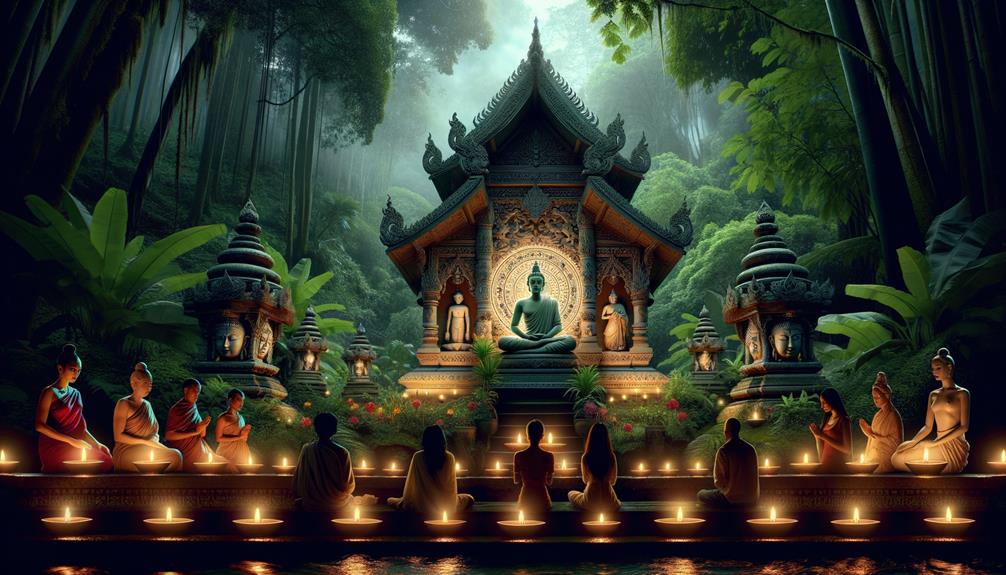
In Jainism, Diwali is a celebration that holds profound significance. It marks the sacred anniversary of Mahavira's attainment of nirvana, symbolizing the triumph of knowledge over ignorance. As Jains light countless lamps, they reflect on their inner quest for self-improvement.
Diwali is an invitation to engage in acts of charity and forgiveness, embodying the virtues Mahavira championed. By doing so, Jains transform their hearts and cleanse their souls, moving one step closer to spiritual liberation.
In the soft glow of lamp light, Jains gather in prayer and meditation, seeking a deeper understanding and connection. Temples become sanctuaries of reflection, where whispers of devotion rise with the incense, honoring Mahavira's journey. Through prayer and meditation, Jains align themselves with the light of knowledge, embracing the promise of nirvana.
Diwali in Jainism is more than a celebration; it's a call to walk the path of enlightenment, guided by Mahavira's eternal wisdom.
Frequently Asked Questions
What Is the Mythology Behind Diwali?
Diwali's mythology is rich and varied, with stories of Rama's triumphant return celebrated through Ramlila performances, Naraka Chaturdashi honoring Krishna, and Dhanteras rituals aimed at attracting prosperity. The festival also encompasses Lakshmi Puja, Kali Chaudas, Govardhan Puja, and Bhai Dooj, which reflect ancient Vedic traditions and the universal theme of light prevailing over darkness.
What Are the Origins of Diwali?
Diwali's origins are rooted in ancient harvest festivals, steeped in cultural significance. The celebration has evolved over time, with regional variations, festive decorations, family gatherings, and traditional foods coming together to create a vibrant tapestry of community celebrations.
Is Diwali a Pagan Holiday?
Diwali isn't a pagan holiday. It has its roots in ancient rituals and spiritual practices, reflecting traditional beliefs. Over time, it has evolved through historic celebrations and cultural exchanges, resulting in regional variations. At its core, Diwali is about universal themes and the hero's journey.
Which God Is Diwali Based On?
Isn't it fascinating that while I light Diyas and share Diwali greetings, the festival celebrates multiple gods and goddesses? From Lord Rama's heroic journey to Krishna's triumph and Lakshmi's blessings, Diwali's spirit encompasses a rich tapestry of stories and legends.

